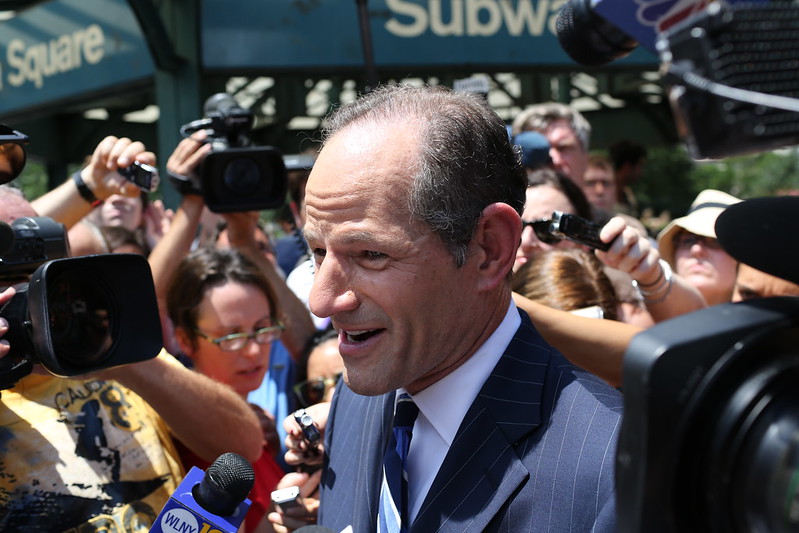I came across an article the other day that made me think that, while I have not been around too long (although long enough to write my memories of obtaining Pokémon Gold at launch two decades ago), I have been eyewitness to American history. What article made me appreciate the enormity of the events that I have witnessed? A Pew Research Center article about the history of U.S. governor resignations and ousters.
The History of U.S. Governors Resigning Under Pressure
Now-former New York Governor Andrew Cuomo resigned from office on August 23, 2021, after serving for just over 10 and two-thirds years.

Photo credit: “Eric Schneiderman Endorsed by Andrew Cuomo for NYS AG” by citizenactionny is licensed under CC BY-SA 2.0
As I noted in July 2020, his administration directed nursing homes to accept elderly Wuhan virus patients from hospitals, which went about as well as one might expect. The stated reason for his resignation had nothing to do with that policy choice.
But I digress.
Two days after Mr. Cuomo left office, Pew Research Center undertook to discover just how many U.S. governors have resigned “against their will.” The results of Pew’s survey were published in an article authored by Mr. Drew Desilver. Mr. Cuomo’s plight, it turns out, was an uncommon one:
Counting Cuomo, only 21 of the nearly 2,400 people who have served as a state governor since U.S. independence have resigned under pressure…
That is not many. But what does “under pressure” mean here?
[U]nder pressure – such as after a criminal conviction or, as in Cuomo’s case, under threat of impeachment…
That criterion is reasonably descriptive. It is subject to some subjectivity, but it sets good enough parameters for which governor resignations should be considered.
Why do I feel like an eyewitness to history? Was Mr. Cuomo’s resignation that important? It was not. But Mr. Cuomo was not the only time my state’s governor has “resigned under pressure” in my lifetime. Let me tell you a story about Client-9.
The Story of Client Number Nine
In 2006, Eliot Spitzer, who was completing his second term as New York Attorney General, won the election for Governor of New York in a historic landslide – defeating his Republican opponent by a margin of 65.3% to 27.1%. He was the first Democrat to win an election for Governor since Mr. Andrew Cuomo’s father, Mario Cuomo, in 1990. For his part, Mr. Andrew Cuomo the son won the election to succeed Mr. Spitzer as New York Attorney General.

Photo Credit: “File:Eliot Spitzer (1335721782).jpg” by Paul Stein from New Jersey, USA is licensed under CC BY-SA 2.0
As Attorney General, Mr. Spitzer gained a large profile. He was rumored to be then-presidential candidate John Kerry’s top choice for U.S. Attorney General had Mr. Kerry won the 2004 election. Mr. Kerry did not win, however, and we were thus denied an administration featuring John Edwards as Vice President and Eliot Spitzer as Attorney General.
Little did anyone (other than Roger Stone) know (or more likely, dare) to say publicly that Mr. Spitzer was living a double life. Mr. Spitzer was busting prostitution rings by day, and soliciting “Kristen” by night. The married Mr. Spitzer was revealed to be Client-9 of Emperors Club VIP escort service.
Mr. Spitzer’s fall was swift. He apologized vaguely when the news of his extracurricular activities broke on March 10, 2008. Two days later, he announced that he would resign effective March 17.
My Memories of the Resignation
At the time Mr. Client-9 resigned, I was the editor of the high school newspaper. I wrote an article on the historic event. I questioned whether Mr. Client-9, who grew up in great wealth, was spending too much money on his hobbies. Having access to unfathomable funds is no excuse for that. (Any amount of money spent on prostitution is too much, of course, but Kristen, it turned out, was a very expensive date.)
My friend at the time sent a question from a school computer to Mr. Client-9’s political website. “Was it worth it?” To the best of my knowledge, the esteemed Mr. Client-9 did not respond. But if we receive an update, you readers of The New Leaf Journal will be the first to know.
Hindsight 20/20: Did Client-9 Need to Resign?
Did Client-9 need to resign? I do not ask this in a moral or ethical sense. This question is restricted to inquiries into politics.
The Story of Former Senator David Vitter
Then-Louisiana U.S. Senator David Vitter, a Louisiana Republican, was revealed in 2007 to have been a frequent customer of a Washington D.C. prostitution ring. Unlike Mr. Client-9, Mr. Vitter did not resign after admitting to his being a client (we do not know his client number, however). Having won election in 2004, Mr. Vitter had the good fortune to not have to run for reelection until 2010. In 2010, Mr. Vitter easily won a second term by 19 points. The Vitter-express was so unstoppable that he deterred a potential primary challenge from a certain Ms. “Stormy Daniels,” who had declared her intent to run before changing her mind.
“Stormy Daniels.” There is a name we never heard again.
But I digress.

Photo Credit: “Outgoing Senator David Vitter, Republican, Louisiana, LAGOP GOTVR Dec2016 150” by tammy anthony baker is licensed under CC BY 2.0
Mr. Vitter would eventually pay a political price for his scandal when, in 2015, he was defeated in a run for Governor of Louisiana.
Did Vitter Show a Potential Path for Spitzer?
Could Mr. Client-9, like Mr. Vitter, have survived had he not “resigned under pressure”? Like Mr. Vitter, Mr. Client-9 did not have to run for reelection until 2010. While Mr. Vitter had the benefit of running in an increasingly Republican Louisiana, Mr. Client-9 would have benefited from running in New York, which owes its heavy Democratic lean to New York City.
Barring a primary challenge (perhaps Mr. Cuomo would have tried), Mr. Client-9 would have had two-and-one-half years between his scandal and reelection. Although 2010 was a Republican wave year, the wave was limited in New York – Mr. Cuomo won the 2010 election for Governor by nearly 30 points.
We will never know whether Mr. Client-9 (aka Mr. Spitzer) could have weathered his scandal storm, avoided his “voluntary” self-removal from office, and successfully run for reelection in 2010 had he held his ground. It is worth noting that his approval ratings before the scandal were abysmal – a problem that Mr. Cuomo did not face in 2020 and 2021. Mr. Spitzer was never as important to his party nationally as was Mr. Cuomo, although Mr. Cuomo learned the dangers of outliving one’s own usefulness.
I know not whether Mr. Client-9 regrets not fighting the calls for his resignation. Even if he does, however, I might suggest spending more time regretting the series of events that led to his deciding to resign in the first place.
Epilogue Mr. Client-9 Ran Again?
In 2013, Mr. Carlos Danger (aka Mr. Anthony Weiner) made headlines when he tried to make a political comeback in a run for New York City Mayor. Many of the headlines came from the fact that new scandals were revealed on top of the old scandals. Really though, I cannot get into the Mr. Carlos Danger nonsense here. The result would rival our longest New Leaf Journal article.
That same year, Mr. Client-9 ran for New York City Comptroller. I am not sure if this needs to be said, but New York City Comptroller is a significant downgrade from New York State Attorney General and Governor. Mr. Client-9 made a race of it, but lost the Democratic nomination narrowly to Mr. Scott Stringer. I am not sure if it needs to be said, but losing a local primary to Mr. Stringer is a dramatic fall from grace for someone who may have once been a few tens of thousands of votes in Ohio away from becoming the United States Attorney General.

Photo Credit: “Eliot Spitzer” by WarmSleepy is licensed under CC BY 2.0
Like Muhammad Ali’s comeback against Larry Holmes in 1980, the less that is said about Mr. Client-9’s comeback the better.
Eyewitness to History
The Pew Research article made me appreciate how much history I have seen happen right before my eyes. In my young-ish adult life, I have witnessed 9.5% of all of the forced-governor resignations in U.S. history in my very own state. How many people can brag about having seen that much history? Amazing stuff. This is nothing compared to the people of California, however. California is currently in the midst of the fourth gubernatorial recall election in U.S. history. People who have lived in California since 2003 bore witness to the second – wherein then-Governor Gray Davis was recalled. If the 2021 recall succeeds, those residents of California will lay claim to having lived through two of the three successful recalls in U.S. history.
We are eyewitnesses to history.